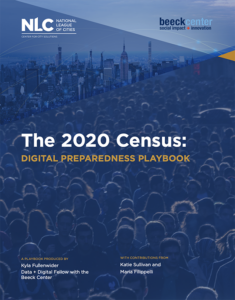Going Digital: The Challenges and Opportunities of the 2020 Census
February 7, 2020 | By Kyla Fullenwider & Katie Sullivan

Last month, the 2020 Census kicked off in Toksook Bay, a remote Alaskan fishing village, as the head of the U.S. Census Bureau, Steven Dillingham, arrived to personally interview the village elder and start the decennial process. While Bureau workers will travel around Alaska “on bush planes, snow machines, or snowmobiles, and dog sleds to get to villages,” this year, for the first time, millions of U.S. residents will have the option to respond to the decennial census online or over the phone, alongside the traditional mail-in form. Federal workers will use handheld mobile devices to conduct the count and social media channels will catalyze rapid, real-time sharing of census news and information.
Though the first “digital” census presents an opportunity for a more participatory count, it also raises a number of obstacles that may threaten the completeness and accuracy of the 2020 Census. An incomplete census count leads to unrepresentative distribution of federal funding and political power while raising inaccuracies within the foundational dataset that is used by planners, policymakers, and researchers nationwide. An accurate census count is vital in ensuring the integrity of our democratic institutions for the next decade and beyond.
For the first time, issues such as data security, digital access and literacy, online form navigation, and social media driven misinformation and disinformation campaigns must be addressed.
Since the last decennial count in 2010, the political and technological landscapes of the United States have changed dramatically. While some challenges such as an increase in “hard to reach” populations persist across census counts, the digital nature of the 2020 Census raises new threats. For the first time, issues such as data security, digital access and literacy, online form navigation, and social media driven misinformation and disinformation campaigns must be addressed. With historic levels of distrust in the federal government, city and local governments will play a critical role in ensuring a complete count of their constituents. City leaders understand the importance of the census in allocating dollars and political representation to their most vulnerable communities. However, many cities lack sufficient preparation and resources to lead the charge in promoting an inclusive and accurate 2020 Census count.
Today we are pleased to publish the 2020 Census Digital Preparedness Playbook which helps address some of these challenges by providing a set of practical resources and explainers on some of the most challenging issues facing local governments as they prepare for the 2020 Census. The playbook provides:
- A framework city leaders can use to understand the unique challenges posed by the 2020 Census including disinformation, cybersecurity, the digital divide, and data privacy.
- Accessible one-page overviews giving decision makers information they need to recognize threats to the census’ integrity.
- In-depth how-to resources helping city leaders plan their response, avoid digital census pitfalls, and increase participation.
- Comprehensive answers to commonly-asked questions about new issues in the 2020 Census including the internet response option.
- A series of case studies highlighting how cities like Baltimore, Los Angeles, and Indianapolis are developing new and innovative approaches fostering census participation.
The 2020 Census Digital Preparedness Playbook was drafted in close collaboration with city officials, subject matter experts, and in partnership with the National League of Cities, Code for America Brigades and National Conference on Citizenship. We invite you to read and share the playbook to better understand the challenges ahead and to help ensure that everyone counts in 2020.
Additional Resources
The rollout of the 2020 Census Digital Preparedness Playbook complements other Beeck Center efforts to support an accurate and inclusive 2020 Census count.
Development of the 2020 Digital Census Playbook
Presentation by Beeck Center Student Analyst Katie Sullivan
Engaging Students in Census Outreach
Presentation by Beeck Center Student Analyst Kelly Crowley
- In the lead-up to Census Day on April 1, 2020, the Beeck Center and the National League of Cities will be co-hosting a series of expert webinars on specific topics like disinformation and digital access. Tune in and get your census questions answered.
Kyla Fullenwider is a Beeck Center Fellow leading our work around the digital implications of the 2020 Census, specifically, what local governments, journalists, leading digital platforms, and the public can do to prepare and participate in this crucial function of our democracy. She previously served as the first Chief Innovation Officer of the U.S. Census Bureau. Follow her on Twitter at @KylaFullenwider.
Katie Sullivan is a Beeck Center Student Analyst, currently pursuing a Masters in Global Human Development at Georgetown University. Follow her on LinkedIn or email her.